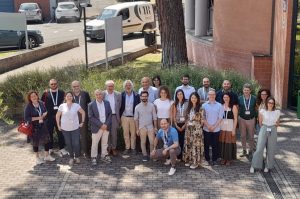 On July 4th and 5th, the Frascati National Laboratories hosted the scientific workshop of the regional project DEUPAS “Ultrasensitive Determination of Pathogens by Spectroscopy”, a research program supported by the Lazio Region as part of the funding initiative named “2020 Research Groups – LazioInnova”.
On July 4th and 5th, the Frascati National Laboratories hosted the scientific workshop of the regional project DEUPAS “Ultrasensitive Determination of Pathogens by Spectroscopy”, a research program supported by the Lazio Region as part of the funding initiative named “2020 Research Groups – LazioInnova”.
The event involved over 40 researchers from different academic fields both from national (INAIL, CNR, INFN, INGV, ENEA, FBK, etc) and international institutions (Linköping University, Graz University) and companies (Sanidrink, etc), who discussed issues concerning air quality and its definition, different sensor approaches and potential innovative solutions.
For years, speaking of air quality we referered exclusively to outdoor air pollution. Nowadays, everyday life and work activities of people is mainly indoors, where they are inevitably exposed to various pollutants of chemical, physical and biological nature. At present, the awareness that indoor pollution is more relevant than exposure to the external atmosphere is increasing.
Air quality is therefore a sensitive and – at the same time – stimulating issue: making indoor environments safe from infections and polluting substances such as particulate matter, VOCs released by commonly used materials (furniture, cooking pans, interior cleaners, etc. ), or molds and pollen, which are at the base of the most common allergies is a real challenge of the modern society. A recent review of the air quality laws in more than 100 countries found that only 12 have national standards specifying threshold limits for indoor pollutants.
The DEUPAS Workshop intends to strengthen collaborations and exchange of ideas within the scientific community on this theme, related topics and on the technological advances necessary for the improvement of air quality monitoring techniques and methods. In the two days we also discussed about the need for innovative tools and equipments and, also how to trigger the discussion to introduce an improved legislation.
At the workshop, new environmental sensors, new strategies for monitoring chemical/physical substances and biological pollutants were presented, and the multiple scientific and technological challenges to probe the air quality were discussed. The abstracts of the contributions to the workshop are available at the link:https://drive.google.com/file/d/1Gu1VNuqQDo_aNXMas6ceuV4M1yrrEZ3J/view
The two days were an important opportunity to consolidate the existing network involving several Universities and Research Institutions and to discuss how to develop and make new instruments available, how to dialogue with the civil society on these themes and, above all on how to support policymakers to give the right answers to the emerging issue in the coming years.
 INFN-LNF Laboratori Nazionali di Frascati
INFN-LNF Laboratori Nazionali di Frascati